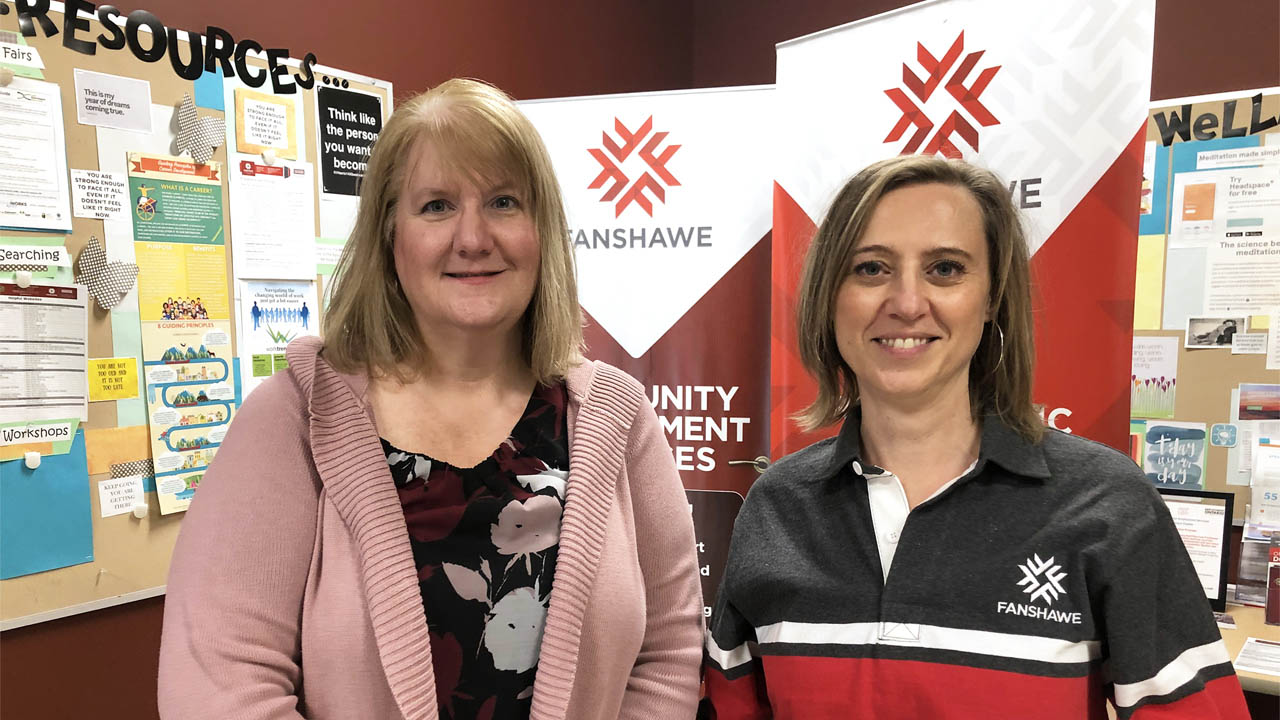Entrepreneurship pilot relaunches for newcomers
 CREDIT: GERARD CRECES
CREDIT: GERARD CRECESAssociate Dean Lisa Schwerzmann (left), and Academic Services Consultant Kate Wypior (right) help newcomers to Canada at the School of Access Studies at Fanshawe’s downtown campus.
For many new immigrants, coming to Canada represents a fresh start.
Unfortunately, even for skilled migrants, that fresh start can also include restarting their careers from the bottom up. That’s where Fanshawe’s Access Studies comes in.
For the third time in the past four years, Access Studies is welcoming another cohort to its Entrepreneurial Pilot Projects for Newcomers program, which is funded by Immigration, Refugees, and Citizenship Canada (IRCC). It is one facet of Fanshawe’s Occupation-specific Language Training (OSLT).
The program is specific to newcomers to Canada with business backgrounds and experience, who are looking to adapt their skills to Canada’s business climate.
Participants in the 10-week program are already established entrepreneurs in their home countries – people whose qualifications don’t necessarily apply in Canada’s heavily-regulated industry.
“We have to remember all those OSLT people are highly educated professionals who worked in their profession back home,” said Kate Wypior, Academic Services Consultant for the School of Access Studies at Fanshawe’s downtown campus. “They quite often had their own businesses, they were CEOs of big companies…they come here and find out they can’t work in their own profession anymore.”
Because many of their chosen industries are regulated in Canada, participants in the program will often have to seek re-certification. It takes time and money to do so, Wypior explained. But in the meantime, they can’t find a job in their field.
The entrepreneurial project does not provide certifications. What they do provide is knowledge of the systems in Canada, as well as education about professional, person-to-person aspects of participants’ chosen professions.
For instance, is it proper to shake hands or kiss cheeks of people you meet? How do you do interviews in Canada? What does a resume need in this country?
It’s that professional etiquette and knowledge of Canada’s socio-cultural aspects of business relations that can require more of an adjustment than a certification exam.
“Language may not be such a barrier because they are highly educated,” Wypior said. “But certainly, everything is different. They are not CEOs anymore, they are applying for different jobs but they don’t have Canadian experience.”
Starting from scratch in a new country has the potential to be disheartening, or at the least, full of frustration.
However, Associate Dean at the School of Access Studies, Lisa Schwerzmann, said that’s not the case.
“What I see from the students I have met, is optimism and almost a determination or a belief that, ‘I will make it,’” she said. “The spirit of, ‘I will get through this.’”
While the program itself is still young, it’s already helped several dozen new Canadians get back in the game, open businesses, and contribute to the local and national economy. Schwerzmann noted that graduates of the program are happy to hire other newcomers to Canada as well, paying forward the good will of getting a head start in a new country.
The current cohort of the Entrepreneurial Pilot Project for Newcomers runs from September through December.
For more information contact: oslt@nullfanshawec.ca.
















